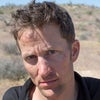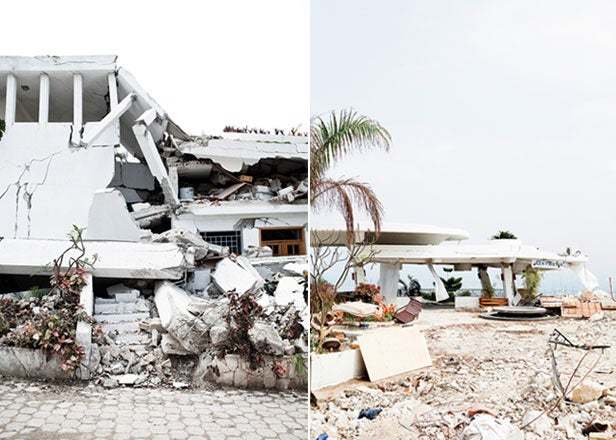JUST AFTER 4:30 P.M. on Tuesday, January 12, three development workers in a dented Toyota van were speeding along a narrow hillside road that zigzagged up to the Hotel Montana, in Port-au-Prince, Haiti. The men, all Methodist ministers, rarely visited this upscale complex, a favorite spot for diplomats, NGO staff, and tourists to gather for a drink and a break from the city's bedlam. The $160 price of a room was more than an average Haitian might make in three months, so the pastors preferred to stay at a modest church guesthouse a couple of miles away. They were headed to the Montana for dinner that night, meeting associates from another aid agency who'd had an earlier engagement there.
Haiti
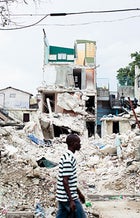 A typical street scene in Haiti
A typical street scene in HaitiHaiti
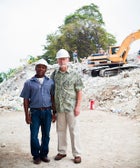 James Gulley with Haitian driver Jean Odrigue Bruno.
James Gulley with Haitian driver Jean Odrigue Bruno.Haiti
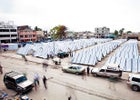 A tent city in Port-au-Prince, Haiti.
A tent city in Port-au-Prince, Haiti.Haiti
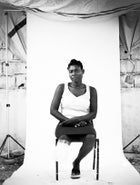 Survivor Elise Adline.
Survivor Elise Adline.After being dropped off at the airy entrance, the three climbed the few broad steps leading to the lobby. Minutes later, at 4:53, a 7.0-magnitude earthquake heaved Port-au-Prince and razed the Montana, instantly reducing the five-story hotel to a burial mound of pulverized concrete, glass, and rebar, killing at least 75 people. For some 250,000 to 300,000 others across the city, entombed by collapsing buildings, this was the end of the story. For these men, it was just the beginning.
I'M ASHAMED TO SAY IT, but when I first heard about the quake I barely took note, glancing at the Web headlines as I hurried out to my local climbing gym. Not until hours later did I come home and realize how connected I was to the disaster. My voice mail contained a slew of messages from my mother, Nancy. “Turn on the news, Aaron,” she said. “Your dad was in Port-au-Prince.”
It might seem oblivious of me that I didn't know that my father, James Gulley, was in Haiti, but he's not your typical nine-to-fiver. He's a third-generation Methodist minister, though not a pastor with a parish like his father and grandfather before him. He started out as a student preacher in rural Illinois, but since before I was born he's worked around the world as a missionary and agriculture specialist, most recently commuting once a month from his home in Frisco, Colorado, to United Methodist Church projects in Africa, Cambodia, and Haiti.
His frantic schedule inspired a family joke: “It's 10 P.M.—do you know where your father is?” In the hours and days after the quake, we had sketchier-than-usual details about his whereabouts. We knew that he'd traveled to Port-au-Prince from New York on the morning of January 11 and that he'd planned to be there through the week. He called my mom from JFK before his flight to Haiti, and that was the last time anyone in the family had heard from him.
For me, the first hours were the most excruciating. Unable to sleep, my wife, Jen Judge, and I sat up late into the night scanning the news, which was grim. The U.S. State Department warned of “serious loss of life.” The UN headquarters and the National Palace had collapsed, and the Red Cross estimated that one in three Haitians were affected. Watching the images of mangled victims and blasted buildings, I couldn't help but think of my 64-year-old father, crushed and dying beneath twisted wreckage. I considered praying, but I don't believe in God. Eventually, I managed about an hour of sleep.
We woke to a phone message from the church headquarters in New York, saying that a volunteer in Haiti had texted that Dad was OK. For the first time in 12 hours, I felt like I could breathe. A few hours later, the phone rang again: Disregard the earlier message. Dad still hadn't been located. With phone lines in Haiti down and misinformation swirling, the next few days followed this exhausting pattern. One minute the news was good; the next, things looked hopeless. A month earlier, Dad had undergone heart surgery and emerged with a clean bill of health. I'd come away thinking I had a while to enjoy his company, but suddenly that episode seemed like a bad omen.
By the evening of day one, the latest word was that Dad and two colleagues, Sam Dixon and Clinton Rabb, had been dropped off at the Montana for dinner just before the quake. No one had heard from them since, and news reports showed that the hotel was in ruins. “I'm not believing anything until we talk to Dad,” my older brother, Jeremy, told me over the phone, his voice cracking. “Or we get the body.” Hearing that, I fought back a swell of tears.
AS WE WOULD LATER FIND OUT, my father and his friends were alive, but they were trapped between limbo and hell. In the lobby of the Montana that day, the three of them had met Rick Santos, Ann Varghese, and Sarla Chand, employees of an NGO called IMA World Health. After the hello's, the six started down a wide corridor toward the restaurant. As they passed the reception area, the walls began to tremble and the floor rose up like a great wave crashing through the structure. In seconds, the Montana disintegrated on top of them.
After the shaking stopped, the lightless air was heavy with cement dust. My dad, injured but alive, called to the others. Five voices replied. He booted up his laptop for light and tried to make sense of what had happened while sticky beads of blood from a head wound streamed onto the glowing screen. The ceiling had pancaked almost everything on the first floor beneath five levels of concrete. But the lobby's coffered ceiling had lodged on the reception desk, which had tumbled on its side, creating a waist-high nook big enough to shield survivors. Dad and four others were hemmed in together. Sarla was trapped alone in a pocket beyond them.
“Oh! My legs are broken!” Sam cried out.
Clint's shout followed: “My legs are broken, too!”
Sam was splayed on his back, with Clint lying next to him on his side. Neither could move. Dad wriggled down beside the men and clawed the rubble away from their legs. Their calves had swelled like water balloons, and their feet disappeared under a concrete girder. Rick gave them the only painkillers he had: a dozen Aleve from a bottle stuffed in his briefcase. As the two men writhed, my father tried to stanch the blood surging from the wound on his head.
The relief of being alive soon gave way to immediate dangers. Was the chamber they were in sealed off from any air supply? No. Before long, they could feel a cool draft coming in from under the wreckage. At least they wouldn't suffocate.
The group could only wait. When they turned off the computer to save battery power, the chamber was as black as the inside of a coffin. So they took turns opening their cell phones—none of which had service—for light. There was no sound except the growl of the occasional aftershock, which started as a distant rumble and then barreled through like a locomotive in the night. They had no way of gauging the scope of the devastation outside. If they'd known that the streets were choked with fallen trees and crushed vehicles and tens of thousands of dead, they might have grasped that there was little chance they'd survive. Instead, they assumed that help was coming soon.
In the early hours, the survivors heard a voice coming from elsewhere in the interior and, after some shouting, discovered that a man named Dan Woolley, from Colorado Springs, was trapped in the elevator shaft. His leg was broken, he said, but otherwise he was all right. Woolley reported that a hotel employee, Luckson Mondesir, was stuck but uninjured in the shaft next to his. My father shook his head at the incongruity of meeting a veritable neighbor from back home in the wreckage of a Haitian earthquake. He and his colleagues kept up a sporadic dialogue with Woolley as the ordeal dragged on.
Fifteen hours after the quake, Sarla heard a different voice calling in Creole, and she yelled into the darkness that there were survivors inside. The person called back—he would go for help—but whoever he was, he didn't come back.
By day two, almost 40 hours in, the group assumed that the person from the previous day wouldn't return. Amid the heat and pervasive dust, everyone was dehydrated. They'd started drinking their own urine, using medicine bottles to take sips. It was repulsive—a couple in the group couldn't do it, and some gagged when they tried.
The two injured men were declining rapidly by then, with Sam occasionally lapsing into nonsensical monologues and Clint thrashing in pain. Though there were quiet moments, everybody tried to keep up a conversation to boost spirits. They prayed, sang hymns, and told bad jokes. As hope flickered, they talked about their families. After one hushed stretch, Sam said, “Tell my wife I love her.” Then he began slowly naming his family members, pausing after each one as if he were visualizing them in the darkness.
AROUND MIDMORNING on Thursday, with helplessness swelling to a sense of urgency, Sarla, who had more room to maneuver but no light or cell phone, decided to search for a way out. In absolute blackness, she crawled over broken concrete and twisted rebar, moving as far as the rubble allowed.
Her first foray dead-ended at a fallen wall. Next she discovered a downward-sloping passage that ended at a metal storm grate. On her third try, she came to an edge where she could dangle her feet. The others shouted to be cautious, as another injury would only make things worse. She debated the idea of dropping into the void but decided not to risk it for fear of wreckage below. Sarla began creeping back. The air was even heavier than before.
Then she called out: She saw light. A few minutes later she heard a new voice. Wondering if it was yet another imprisoned victim, she shouted, “Who are you? Do you need help?”
“We are French firemen,” came the reply. “We are here to take you out.” The six survivors burst into the doxology, singing “Praise God, from whom all blessings flow …”
Several hours passed before the rescuers were able to tunnel through the collapsed walls. The team worked methodically, bracing beams with jacks as they went. Finally, 53 hours after the quake had struck, they reached Sarla and slid her out on a stretcher. It took two more hours to chip away a tiny passage to the deeper chamber where the other five were trapped. When they reached the five, the rescuers told them to lie on their backs, with arms outstretched, then they carefully pulled each survivor by the ankles through the narrow hole—first Rick, then my father, and finally Ann. The crevices were so tight that when they pulled Dad through, he had to look over his shoulder so his face wouldn't scrape the cement. Dan Woolley and Luckson Mondesir were extracted nine hours later through the top of the elevator shaft.
While the rescuers freed my dad and three others, they gave Sam and Clint—both still pinned by the concrete—water and morphine. They told my father that they would bring the two men out soon, but by the time Dad's group was taken to the U.S. embassy, an hour later, neither had emerged. Sarla, Rick, Ann, and my father were airlifted to Miami on a C-130 transport plane the next morning.
Twenty-four hours after emerging from the Montana, Dad hobbled off an American Airlines flight into Denver International Airport. With his face ashen and bits of gravel still embedded in the skin around the stained bandages on his hands and head, he looked as battered and haunted as Lazarus. I wrapped him in a massive hug, and he felt frail and withered in my arms. Everywhere I looked I saw family and friends beaming, crying, relieved.
The elation dimmed quickly. That night, we found out that Sam had died of cardiac arrest before the firemen could free him. Clint, who fought through a protracted rescue effort that involved amputating his legs on the spot, died a day later in a Florida hospital. Though I wanted to revel in the joy and relief of my father's homecoming, the thought of their families—and of the thousands of Haitians dead or dying in the wreckage—positioned our family's experience as what it was: a small, lucky aberration in an unimaginably profound tragedy.
A FEW DAYS AFTER DAD made it home, an NPR reporter asked him whether, given all that he'd been through, he would go back to Haiti. “Absolutely,” he said without hesitation. When the quake hit, he'd been in the process of vetting program proposals for livestock, fruit trees, dairy processing, and microcredit. Haiti was going to need those enterprises now more than ever.
Given my father's moral convictions, his commitment didn't surprise anyone in my family. “Theologically, I can't answer the question of why my life was spared and the lives of my friends were not—why the lives of thousands of Haitians have been lost,” he told me. “All I can do is use the gift of life that I've been given, not selfishly for myself but for the sake of other people.” That my father, a lifelong minister, would return to his work was a fait accompli. What was surprising—at least to me—was that as soon as he began organizing his return, I knew I would go with him.
Dad and I have always enjoyed a solid relationship, but I wouldn't call us close. We share a penchant for distant lands and an indifference to money, but the thing that defines him—religion—divides us. I was put off by Christianity as a teenager when I attended a boarding school in Nigeria run by a dogmatic branch of the church. Dad's theology is as informed and expansive as is possible under the Christian umbrella, and his work is rooted in social justice. Still, I've never managed to reconcile my childhood experience with his faith.
More recently, I'd seen him repeatedly at odds with the very church to which he's devoted his life: Because of politics and philosophical differences, he was sometimes treated with disrespect or blocked from pursuing good ideas that inspired him. When this happened, he always turned the other cheek. I admired that conviction, but I also pitied him for what I considered his weakness and naïveté. All of which is to say, I was not the ideal candidate for a Methodist mission to Haiti.
And yet I signed on. While living through my father's survival experience, I'd felt a connection, slim as it was, to all the desperate victims wailing over lifeless family members on TV. For the first time in a decade, I felt as though I could look past my hang-ups with Christianity, especially the arrogance and hypocrisy I see in evangelism, to the more basic messages of compassion and charity. I felt compelled by the gift of my dad's life to go to Haiti and see what use I could be.
EXACTLY 40 DAYS AFTER the quake, traveling with Dad and Jen, I flew to Port-au-Prince on a steamy Sunday afternoon. Dad had come back for the Methodist Church of Haiti's annual conference, which, having been scheduled for mid-January, was another casualty of the quake. I sensed that his return was as much an expression of solidarity as it was about the meetings.
From high above, the city showed little sign of distress, looking like a vast expanse of squat rectangular buildings tumbling down from naked, brown mountains to the glittering sea. As we glided lower, though, clusters of red-and-white tents began to emerge like an angry rash.
���ϳԹ��� the airport, a caramel-skinned woman crying “Praise Jesus!” tackled my dad with a hug. Donette Lataillade, the animated former manager of the Methodist guesthouse, hadn't seen him since he set out for the Montana on January 12, and she embraced him like family. “I can't believe it! I can't believe you're here,” she cried. She took to calling him the Miracle Man.
On our way in from the airport, we saw fields choked with white dome tents, pitched between buildings that sagged like carcasses. This neighborhood, Delmas, wasn't hit as hard as other parts of Port-au-Prince, but there was no shortage of ruin. Lataillade showed us around the Methodist compound. The school buildings there had crumpled and folded, but no one had been hurt, because classes had finished for the day. Nearby, a collapsed home had crushed a woman and her two granddaughters to death. “When this happened, I didn't have any idea about earthquakes,” Lataillade said. “No one did. So many people ran inside their homes to hide. I thought the world was coming to an end. Sometimes it feels like it has.”
Lataillade told us about the first few days after the quake, when bodies were everywhere and everyone in the city was rifling through the debris to save their loved ones. “We saw so many Red Cross helicopters flying toward the Montana, taking people out,” she remembered. Dad was silent, listening. Because of the Hotel Montana's high profile, it was one of the first buildings to get attention from rescue workers. He'd survived, in large part, because he had enough money for a meal at the most expensive place in town. “But no one came to help the poor,” Lataillade continued. “They were digging by hand. So many weren't able to bury their families. That's all anyone wanted, to lay their family to rest with dignity. Is that too much to ask?”
Dad, Jen, and I were assigned a second-story, dorm-style room in a building beside the guesthouse. Dad liked the building; it was where he and Sam had stayed the night before the disaster. I was less fond of it, especially since the quake had ripped a jagged, 12-foot-long crack in one of the concrete walls. At 4:36 A.M., I was jerked awake by strong shaking. My metal bed frame rasped across the floor, and the glass panes in the louvered windows tapped as if a flock of birds were pecking them.
Dad was still snoring when the aftershock stopped a few seconds later, so I called to him: “You feel that?” He had, he said, getting out of bed to go to the bathroom. Jen and I sat quietly in the darkness, unsure of what to do. When he returned, he said, “That was shaky.” He was asleep again in minutes. I lay awake till dawn. When we got up, we heard that the quake had registered 4.6. Two more light tremors rattled the city a little past 10 A.M.
The aftershocks, which had been rolling across Port-au-Prince sporadically since January 12, were paralyzing the city almost as much as the initial quake. Everyone was terrified of enclosed spaces. Even people whose houses were standing continued to sleep in the open. The displaced had commandeered every bit of empty space—parks, schoolyards, medians, ditches, entire streets—with tents, tarps, and makeshift cardboard beds.
After breakfast, Jen and I borrowed one of the tents we'd brought as donations and set it up for our stay. When I mentioned this to my father, he seemed unfazed. “I'm sure the room is fine,” he said. He was eerily composed in spite of everything. Some friends back home had suggested that this nonchalance was a symptom of post-traumatic stress disorder, but I didn't think so. “Everyone has asked me if the earthquake will change how I live,” he told me after he returned from Haiti, “but I can't think of what I would want to do differently.”
WE SPENT OUR FIRST DAYS surveying the city. On a nearby side street, we drove by what was once a popular apartment block for UN staff. Now it was a scree field. As we contemplated the site, I saw a thin young Haitian in a black T-shirt headed down the road. He stared straight ahead and clopped awkwardly along, almost sleepwalking. I called to see if he was OK, and after hesitating, he came over. His name was Marco Ulisse, he was 26, and before the quake he'd been a college student. Now his school was demolished, his home was destroyed, and his immediate family were all dead. “I don't have a father,” he said. “I don't have a mother. I don't have money.” He wasn't asking for anything, just stating the facts. “Every day I walk the streets. I need a job. I need something to do. But there's nothing.”
A few blocks away, at the five-story Caribbean Market, glass doors seemed to beckon shoppers into the intact front half of the building, while the numerous floors in the back portion were tipped and scattered like playing cards. Security guards looked on from the shade of a distant shelter as looters crawled over the wreckage with hacksaws, cutting away lengths of rebar for reconstruction and digging for food. One of the guards said there were around 100 people entombed here. A young boy no older than six walked around the parking area shouting, “Il y a des morts!” (“There are dead inside!”) He offered to guide me into the wreckage to see a corpse.
To my relief, we saw very few bodies during our time in Haiti. Most of the dead had long since been buried in mass graves at the edge of the city. Still, given the official body count of 250,000 people, or around 2.5 percent of the country's population, I was surprised we didn't encounter more. Relative to the total population of the U.S., that's like smudging out both Los Angeles and Chicago. No wonder so many Haitians were wandering around like zombies.
The same scenes played out everywhere, and survivors measured the quake's impact not by whether a relative had died but by how many were lost. Recovery amounted to sweaty men and boys picking away at the wreckage with sledgehammers and saws. For all that I'd seen and read about the relief effort back home, Haitians didn't appear to be getting much help. And yet here was my father, risen from the wreckage and walking around unscathed, like an apparition.
MOVING FORWARD, the biggest challenge in Haiti is that, even before January 12, the place barely subsisted. The roads were so decrepit that driving was virtually impossible. Hospitals often required patients to bring basic supplies like gauze and alcohol. And 60 percent of the food consumed in the country was imported from overseas. “Haiti is the most desperate place I've ever been,” my father had told me after he began working there in 2007. Which means, obviously, that the international community isn't just facing the acute demands posed by the quake; it is confronting a country that needs to be rebuilt from the ground up.
Because of the quake, there might be the backing to do it. In late March, 59 countries pledged $9.9 billion to Haiti over the next three years, including $1.15 billion from the United States. Dad was pleased by this but also cautious.
“The problem is to ensure that the money is used to create sustainable ways of moving forward,” he said. “If we don't build roads throughout the country, sewers, an airport, a new port, we are going to find these investments consumed. It's easy to deliver money for relief and development. What's much more difficult is making fundamental changes in the way people think and live so we don't create new dependencies.”
Port-au-Prince was awash with aid workers who'd put their lives on hold to help with this change. I noted, grudgingly, that among the army of acronym-laden 4x4s that thrummed through the streets—USAID, UNICEF, MINUSTAH (the UN's stabilization force in Haiti)—there were many Christian institutions. The Catholic Church was funneling food and shelter from overseas to its hardest-hit parishes, and representatives from World Vision were providing tent-to-tent counseling. There was a multitude of individual Christian volunteers, too, like Wade McGuinn, a pink-faced, 54-year-old United Methodist from Lexington, South Carolina, who had parlayed his support of an orphanage in the western town of Jérémie into a full-fledged fundraising drive and then chartered two small planes to personally deliver the donations. When we met him, one of the planes was on its 29th trip.
Of course, there was no shortage of secular volunteers doing compelling work, but seeing so many people inspired by their religion to take honest, virtuous action cast Christianity in a positive new light for me. In some small way, I would walk away from Haiti with this new bridge teetering out toward my father.
Meanwhile, we saw firsthand what the Haitians were up against when we helped a team of doctors conducting mobile clinics in some of the refugee camps. One patient in particular, a woman at the 500-person camp in Delmas 33, haunted me. Elise Adline, a 38-year-old teacher whose right leg had been amputated below the knee, was on her way back to her tent when I met her. She had no crutches, so two family members propped her up as she hobbled. I followed them back to the tent, where a few children gathered to admire the chalk-white bandages that the doctors had applied to Adline's stump. The dressings wouldn't stay clean for long. Adline and five of her relatives were living in a shelter they had rigged by stringing a USAID tarp over four rebar posts. The walls were made of old sheets, and dirt poked up through the carpet floor.
Listing uncomfortably to the right to take the weight off her stump, Adline hunched on a scrap of dirty carpet and told her story. A wall in her home had fallen during the quake and crushed her leg. She had gone to the hospital first thing the next morning, but half of that building had also collapsed and the place was a chaos of injured and dying. It wasn't until four days after the quake that a doctor finally saw her. “He told me he had to amputate,” Adline remembered, her eyes empty. “He said that if I had come sooner I might not have lost my leg.” Her eyes swelled with tears.
One thing I didn't inherit from my father is his optimism and patience. He said that the whole time he was in the Montana, he always assumed he would live. “Since we were trapped, it seemed logical that someone would be looking for the prominent people who frequented that hotel,” he said. That evening, after returning from the refugee camp, I told him the experience had left me both outraged and defeated.
“Everyone says that Haiti is hopeless and that profound change will never happen here,” he said. “But look at Rwanda, where 16 years ago the Hutus were slaughtering the Tutsis. And then comes Paul Kagame, who stepped in and put the country on a new path with new education and health institutions and jobs and opportunities for the people. If Rwanda has a future, Haiti can't be hopeless.”
Normally, I would have trained my indignation on the image of Adline sleeping in the dirt. But at that moment I needed to believe my father, to share his faith and hope.
WE DIDN'T FINISH the trip's final task until our last morning in Haiti. We woke early and drove past quiet streets and up the switchbacks to the site of the Hotel Montana. Two U.S. soldiers guarded a 15-foot-tall metal gate at the entrance, but they let us pass when my father told them his story.
What remained was being run by DRC Emergency Services, a private U.S. firm that specializes in disaster relief and reclamation. We registered at a checkpoint manned by soldiers, donned hard hats, and were escorted to the hotel viewing area by site supervisor Bob Cantwell.
Once a regal complex of whitewashed facades and colonial arcades with views over the Caribbean, the Montana was now notable for what it was not: The building was completely dismantled, almost entirely gone. Dump trucks and heavy machinery dug through the remaining rubble while groups of soldiers looked on. Since the quake, 20 survivors had been freed and the remains of 75 people had been identified, including 15 of the 16 Americans known to have been at the site. A few days after our visit, the last American would be recovered. “Our charge is to go through every piece of rubble until we've found all remains, personal effects, anything,” Cantwell said.
My dad told his story again that morning as we watched the continuing recovery efforts, and we all listened intently. When he reached the part about Sam and Clint, he stopped, tried to compose himself, and then began sobbing. It was the first time I'd seen him lose control since the disaster, and I started crying, too. Mine were tears of sorrow, but they were also selfish tears of joy. For reasons that were unfathomable to me, I was fortunate enough to have a father—and all the wisdom and guidance and frustration that goes along with that—for a little while longer.
“That's quite a story,” Cantwell said when Dad was done.
“My story is only significant in the context of the bigger story of the people of Haiti and what they've suffered,” my father replied. “I don't think the things that I can do are going to fix this country. But I can do a part, just like you're doing yours. And maybe all of those parts add up to a profound change.”
On the drive down to Port-au-Prince, a few hundred feet from the Montana, we passed a group of men picking at a collapsed building with crowbars and a saw. They stopped briefly to wave and then crouched back down to the endless task of rebuilding their lives.

